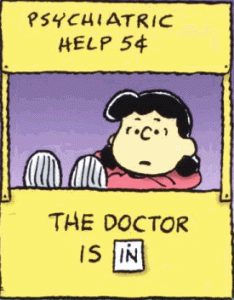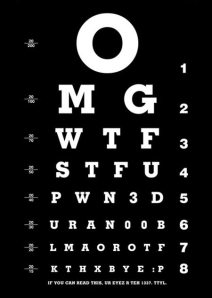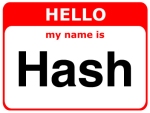Since I am in Atlanta visiting friends, a bit swamped with work, and getting ready to start querying, I thought I’d post this oldie but goodie from my “How to Write Full Time and Stay Sane” series. Enjoy!
—
How to Write Full Time and Stay Sane is a series that offers advice to full-time writers about how to stay productive and in good spirits.

Staying sane is something I’ll admit I haven’t been doing very well the past week or so. Although I’ve had some exciting successes in that time (sold my first piece to a magazine, landed another gig teaching a summer workshop), I’ve also received my first few query rejections for my manuscript. Because of this, I have assembled some tips as well as links from industry professionals to help you deal with this agonizing process.
Now, no one is more self-deprecating than I—nor will you find more of a realist (although, some might use the term “pessimist”)—so I’ve mentally prepared for this time of literary limbo. In fact, more than one writer and loved one has scolded me for referring to the query process as “the rejection process” before I’d even received one. But I can’t help it: I’d much rather be pleasantly surprised than sorely disappointed.
 Which are you?
Which are you?
But even with that in mind, and even if you get the nicest, most personalized rejection (and I’ve gotten two of those so far), rejection still sucks.
You know getting rejections is normal; you know how subjective this is; you know how pertinent finding the right agent is; you know you must locate someone who falls head over heels for your work; you recognize how tedious of a task that’s going to be . . .
. . . but you also know you’ve put tens of thousands of hours into the writing and editing of this thing, and you’re doing the most vulnerable thing you’ve ever done by sending it out into the world—and then someone doesn’t want it for whatever reason.
So, yeah, rejection sucks no matter how ready you are for it.
 HOW TO DEAL
HOW TO DEAL
Tip #1: File It & Forget It
In a recent Write-Brained Network LIVE CHAT, a friend of mine—whose manuscript has been rejected 28 times—said that every time he gets a rejection, he files it and moves on to something else.
That’s great advice. And if you can do that, more power to ya. I think the more seasoned you become in this business and the more irons you have on the fire, your skin can definitely thicken—but we’re not all there yet.
As well, I am lucky enough to be able to do this full time, and believe me: news of my first story getting accepted to a Virginia magazine alleviated some of my “I’m-going-to-die-hopeless-and-penniless-and-20-lbs.-over-weight” (Thank you, Stuart Smalley) attitude. However, I fully realize that many of you reading this have day jobs. The only thing you’ve got cooking is your manuscript, and you don’t have time to distract yourself with other writing endeavors.
So, although filing and forgetting might sound good on paper (or on screen, as it were), I realize it’s easier said than done. Which brings me to . . .
 I’m good enough, I’m smart enough – and doggone it, people like me.
I’m good enough, I’m smart enough – and doggone it, people like me.
Tip #2: Send to a Friend
During the writing and editing process, we are discouraged from showing our work to loved ones because so many amateurs make the mistake of thinking that if their mother or spouse loves the book, it’s bound to be a New York Times bestseller.
Along that same vein, I am not suggesting you appeal to family and friends for a critique of your manuscript, but now is the time to revel in their bias toward loving it. Print out a few copies and send them to your biggest fans.
While it’s gut-wrenching (no matter whose eyes scan your pages), if you include a close circle—those who’ve been rooting for you all along (your buddy from work, who always asks about your progress; your parents, who are eager to see what you’ve been doing all this time, etc.)—you are sure to get rave reviews.
As long as you take their glowing assessments for what they are and don’t let them cloud your realistic attitude toward the query process and the publishing industry, this praise can be just the ticket to convince you not to jump.
After all, regardless of whether or not your book will ever get any agent to want it, regardless if the book is even publishable, remember: completing a manuscript is a huge accomplishment. You deserve to have someone stroke your ego a bit.
 Your manuscript is GRRRRRRREAT!
Your manuscript is GRRRRRRREAT!
CONFUSION
When my first rejection rolled in, I scoured every resource I knew to figure out how to respond.
First of all, don’t get me wrong: I know you aren’t supposed to respond.
But the rejection was not just a personalized version of a form rejection letter. As well, a YA author friend of mine had given me a referral to this agent because she represented said YA author friend, and the agent had mentioned our mutual acquaintance in the e-mail, so it wasn’t as though this was a cold query.
While I knew not responding at all would have been perfectly acceptable, and while I wasn’t going to lash out at the woman, I went back and forth about sending a “thank you.”
Agents are flooded with e-mail daily, and many are quite vocal on their blogs and on Twitter about not wasting their time, but in doing a little research, I found several well-known agents with conflicting information. (Wait, agents don’t all agree on everything??)
HOW TO DEAL (AGAIN)
Tip #3: Seek Professional Help
When in doubt, turn to the rejecters themselves—agents and editors. Many have blogs and other Web sites dedicated to everything from their personal preferences to typical response times.

Here, former Curtis Brown Ltd. agent Nathan Bransford lists acceptable etiquette for rejection follow-up.
For a different perspective, see this post by former agent, Penguin Group’s Colleen Lindsay on what not to do after a rejection.
Over on her blog, FinePrint Literary’s Janet Reid—Madame Query Shark herself!—describes how to cut down on your anguish over unanswered queries by making sure you haven’t sent something that isn’t a query.
Tip #4: Gain Some Perspective
Once you’ve gotten a few rejections and you’re feeling like a hack, it’s important to put it in perspective and remind yourself that it’s normal.
 Rabbit or duck?
Rabbit or duck?
On her blog at QueryTracker, YA author Mary Lindsey discusses how to handle rejection at arm’s length. Her article is good on its own, but Lindsey references Hal Spacejock series author Simon Haynes’s post, “Rejection of the Literary Kind,” which is also worth a read.
As well, on his Web site, sci-fi writer, photographer and Web designer Jeremiah Tolbert offers an editor’s perspective on rejection.
To round out this area, over at Streetdirectory.com, award-winning romance and nonfiction author Dana Girard categorizes rejection into seven levels and suggests ways you can decode what each kind of rejection means in terms of your manuscript.
Tip #5: Commiserate
For those days when you feel like you’re the only person who sucks this bad, check out the following sites for a little misery-loves-company.
 Want some company?
Want some company?
At Absolute Write Water Cooler, you can find several conversation threads where people share their rejections stories, but here’s a link to one where some poor schlubs compete for who got rejected the fastest. Can you beat 30 seconds?
If you’re looking for a gold mine in terms of rejection, bitterness and hilarity, check out Literary Rejections on Display. The person running the blog—Writer, Rejected—actually says in the About Me profile, “I am a published, award-winning author of fiction and creative nonfiction—but whatever. In the eyes of many, I am still a literary reject.” Writer, Rejected posts his/her own rejection letters (as well as rejection letters sent in by others) and analyzes them—in a sane and fair way (usually). There are several good posts, so definitely make time to poke around in the blog, but here is an example of a rejection analysis.
And here’s a cranky little rant by freelancer Chris Rodell titled “Reject Me, Please” over at his Media Bistro blog. If you’re especially pissed off and cynical, this is the post for you.
PEP TALK
This last post (from Nathan Bransford’s blog by guest blogger Jon Gibbs) isn’t directly about getting rejection letters, but it discusses how we reject ourselves at times—how we make excuses for why we can’t do this and that.
Use this when you’re in need of a little pep talk, and it’s sure to snap you back to a state of sanity.
 If you’re seeing the old lady, you definitely need a pep talk.
If you’re seeing the old lady, you definitely need a pep talk.



















































